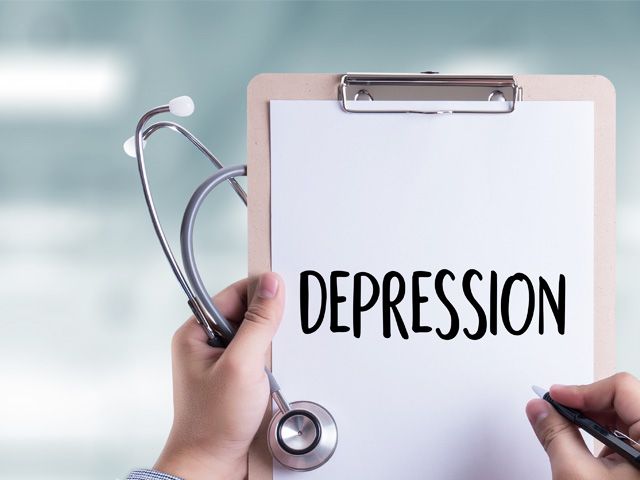 The consulting psychologist supervisor, Ms. Lee Li Li, shares about the topic “Why are depression victims getting younger?” at 2:30p..m. at NTV7 (Live) on 7th April 2017 (Friday).
The consulting psychologist supervisor, Ms. Lee Li Li, shares about the topic “Why are depression victims getting younger?” at 2:30p..m. at NTV7 (Live) on 7th April 2017 (Friday).Depression

Depression is one the most common epidemic among youths in this 21st century.
Definition of youth and age of teen with depression
Youths can be defined as an individual aged between 12 - 18 years old. In today’s context, the age on a youth can be extend to the age of 20 years old due to the higher education levels that they received in this new era.
Cause of Depression
1. Psychological or mental issues

- Poor interpersonal skills - Youth nowadays lacks of face-to-face interactions. They usually depend on technologies and social media to communicate with the society. Hence, when it comes to social issues, they feel upset that they fail to perform in better or at the same level as their peers. During the teenage years, youths constantly seek for peer’s affirmation, experiences poor body image or experience poor social image, the youth will experience low self-esteem and low self-confidence, and might lead to depression.
- Poor academic performance - Nowadays, youths’ daily activities are mostly focusing on studies and academic aspects. Parents also have incorporate studies into youth daily live. Although youths are getting knowledgeable, they fail to apply and generalize the knowledge that they gained into real life. Therefore, when obstacles happen, they will display poor problem solving skill which lead to low resiliency in overcoming obstacles.
- Unpleasant past experiences
- Health issues - Health could affects our emotional state. When a youth struggles to cope with a situation that affects their health (e.g. injuries that causes inability to perform their activities, or hormonal changes which cause changes in physical appearance), it would affects their social well-being and also their academic performance as well. These would further attributes to facing depression.
2. Family hereditary
- There are no scientific proven depression is a hereditary disease. Nonetheless, the history of depression within the family could be caused by the interactions between the family members as well as parent-child relationship. The first family member who was diagnosed with depression may experience lacking of warmth and affection receive from families members. This member of the family will isolate from interacting with people which results in depression. This pattern continues from one generation to the next, hence it may appear to be a hereditary disease.
3. Personality and child’s development
- Personality are more inborn within a child than it is learned. These personality could be developed during prenatal period, whereby the mother’s emotional, mental, and physical state would affect the child’s personality. The mother’s negative emotion can affect her unborn child to feel insecure. If a child is sensitive and eccentric, he or she may display stubbornness or short-fused behavior. For instance, he or she may think a person is not a good person if he or she has concluded that this person does not carry good character by disregard the good deed the person has done. No one can ever change their mind. Therefore, the risk of them being diagnosed with depression will be comparable higher as they grow up. Their chances of having depression may alter according to the environment. Adults may help the children to think optimistically.

Symptoms of Teenage Depression
It is more difficult to detect whether a youth is experiencing depression in adolescent stage. Reason being, they are experiencing high emotional and hormonal changes, which affects their quick changes in emotions.
- Emotionally depress – The youth will be suspicious of depression when he/she shows the symptoms for two weeks. For example, loss of interest in activities or hobbies once pleasurable, fatigue and decreased energy, difficulty concentrating, and get restless or more cranky than usual
- Tiredness - Does not seemed to have energy to complete a task
- Unenthusiastic - Lost of enthusiasm even towards the activities that he/she prioritize or love
- Lack of concentration - Unable to concentrate to achieve his/her goals
- Insomnia - Difficulty in sleeping during the night
- Eating Disorder - An individual with depression might experience a sudden change of appetite, in which he/she began to eat more than he/she used to, or lesser than he/she used to or not eat
- Self-blame, self-harm, suicide - The youth might self-blame on every situation that went wrong. He/she will then self-harm (e.g. cutting on him/herself), which would probably leads to suicide if depression was not being treated

Depression self-test
- I am becoming more reluctant to go to school/work
- I loss interest to a lot of things gradually
- I unable to sit still and calm down gradually
- I want to be alone all the time
- I do not want to do a lot of things gradually
- I am becoming lazy and demotivated
- I am feeling that my body is uncomfortable
- I feel frequent chest tightness
- I feel fatigue and loss of energy easily
- I get insomnia or sudden awake easily
- I am getting more and more impatient
- I am feeling more irritable
- I am getting more dislike to my current living environment
- I am getting angry easily
- My mood is getting worse
- I am feeling there is nothing to make me feel better
- I am feeling I am becoming the worst person
- I am getting more difficult in concentrating
- I am feeling more disappointed about myself
- I am feeling more to disappear from my family and friends
 Scoring:
Scoring:One mark for each question
12 and above: High risk of depression. Suggestion to find school counsellor or professional for help.
6 to 11: Moderate risk of depression. Emotional unstable and fluctuates. Suggest to express the feeling and share the issues with someone you trust and solve the problems together.
5 and below: Low risk of depression. Continue to live healthily to help in managing emotion and stress positively.
Treatment towards Depression

- Identify the source of depression, accept it, and resolve it - Through understanding the source of depression, we are able to give ourselves empathy, and solve the problem. For example, if the source of depression stems from his/her financial obligations, we can advise the individual to seek for a financial adviser for help and reduce the risk of depression
- Stimulate enthusiasm – Once we have identify the source of depression, we should trace back to the things that make us happy, to help us retrieve our enthusiasm in life. Even if we have lost touch of our initial source of happiness, we could and should create a new interest to spark our life
- Embrace nature - We could engage in outdoor activities and embrace nature. The reason being, nature emits positive energy and absorbs negative ions, which help us to relax
- Psychotherapy - If the individual is facing severe depression, it is important to seek for professional help
- Medications - Medications are used to control and cope with negative emotions, such as anxiety
Prevention towards Depression
1. Equip youth with life skills and survival skill
- Youths nowadays have their life filled with classes to fulfill good academic grades, which have neglected the development of their life skills and survival skills. The concept of learning (such as attention, knowledge, and thinking), should be intrinsic rather than extrinsic which their learning ability should aid in improving their analytical thinking and expressive skill.
- With good self-discipline, communication and adaptation towards life, youth are able to prevent depression as well.
- Youths could also engage themselves with societal activities, which not only bring values to both the society and individual, but also build respect between one another.
- In a fast-paced society, we have turn towards a more utilitarianism concept, and have neglected the humanitarian spirit with one another, leading us towards a world of self-profit.
- b) When we are learning a subject matter, the learning process should be prioritize first rather than the end result (e.g. grades). Parents could guide the child and place the priorities on their learning process and learning thoughts.
 3. Equip youth with life experiences and coping skill
3. Equip youth with life experiences and coping skill
- Encourage youth to join more social activities and participate in camps to enrich a child’s life experience which also enhance their problem solving skills. In particular, their psychological adjustment when dealing with challenges. For example, when they are dealing with someone they dislikes, youth should learn to make adjustment and take in advice from teachers.
Relaxation techniques could help in slowing down our schedule, heart rate, or breathing, in which could reduce anxiety and improves our well-being. These relaxation techniques are needed to be done long term to witness an effective result. Below are a few relaxation techniques which should practice for at least 15 minutes:
- Meditation - Sit comfortably on a chair, have your feet relax and rested on the floor, and have your hand rested on your laps. Close your eyes, and clear your mind. You could play some relaxing music. After you are comfortable with the posture, slowly stop the music (Note: Acknowledge any negative thoughts rather than suppressing it. For example, if there is undone work, acknowledge that thought, and let yourself know “it’s alright. I can do it later. I want to clear my mind now”).
- Breathing – Inhale through your nose, and exhale through your mouth. When we inhale, feel your belly expand, whereas feel your belly contracts when exhaling. You could also try inhaling in four counts, and exhaling in four counts. Continue for 15 minutes or until you feel calmer
- Raise up your hand – Raise your arms from knee to the level of shoulder. Put it down after that. At the meantime, slowly close your eyes and shift your attention to your hand. This method is suitable for youths who have difficulty in calming down. Through this method, they are able to aware that the hand is moving, hence slow down the pace
- Walk – Practice this method barefoot or by wearing comfortable shoes. It is more effective if you walk barefoot on grass. There are four steps in this practice: Lift, Move, Put Down, Out. At this moment, relax both arms, eyes look to the front at 45 degrees. You may choose to listen to music, then walk in slow pace attentively
Note: The above content was received from NTV7 on the topic “Why are depression victims getting younger?” on 7th April 2017 (Friday). For more details, please contact our administration office. We will have our psychologist to advice you further. Thank you.





